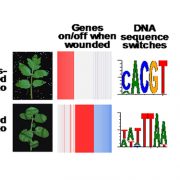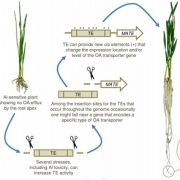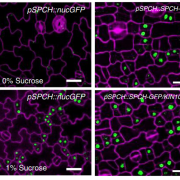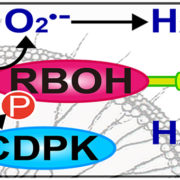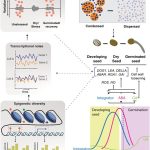Review: The role of ethylene in plant temperature stress response
 The phytohormone ethylene is known for its importance in plant development and mostly for its role in fruit ripening. However, in this review Huang et al. summarize recent findings on ethylene’s role in temperature (hot and cold) stress response and ethylene crosstalk with other hormones. Interestingly, different plants respond to heat stress differently. For example, heat stress induces ethylene production in Arabidopsis, wheat, and pea whereas it inhibits ethylene production in tomato and lettuce. These effects are also tissue specific; in Arabidopsis, at 45°C ethylene levels in roots and shoot apices remain unchanged but are induced in leaves. Furthermore, thermotolerance of many plants is induced by external application of ACC (an ethylene precursor) or ethephon (converted to ethylene in the plant). Generally, the heat-stress responses are mediated by heat shock proteins, which are induced by heat shock transcription factors, and in Arabidopsis ethylene signaling activates some heat shock transcription factors. Ethylene also mediates freezing tolerance in a species-specific manner. Freezing tolerance in tomato, tobacco and Arabidopsis is increased by ACC application, whereas inhibitors of ethylene synthesis improve freezing tolerance in Medicago truncatula. Thus, effects of ethylene stress response can be positive or negative depending on plant species and developmental stages. Transcription factors in the AP2/ERFs family integrate BR, JA and ABA signaling and could provide targets for genetic efforts to enhance plant tolerance to heat or cold stress. (Summary by Indrani Kakati Baruah, @indranikb) Trends Plant Sci. 10.1016/j.tplants.2023.03.001
The phytohormone ethylene is known for its importance in plant development and mostly for its role in fruit ripening. However, in this review Huang et al. summarize recent findings on ethylene’s role in temperature (hot and cold) stress response and ethylene crosstalk with other hormones. Interestingly, different plants respond to heat stress differently. For example, heat stress induces ethylene production in Arabidopsis, wheat, and pea whereas it inhibits ethylene production in tomato and lettuce. These effects are also tissue specific; in Arabidopsis, at 45°C ethylene levels in roots and shoot apices remain unchanged but are induced in leaves. Furthermore, thermotolerance of many plants is induced by external application of ACC (an ethylene precursor) or ethephon (converted to ethylene in the plant). Generally, the heat-stress responses are mediated by heat shock proteins, which are induced by heat shock transcription factors, and in Arabidopsis ethylene signaling activates some heat shock transcription factors. Ethylene also mediates freezing tolerance in a species-specific manner. Freezing tolerance in tomato, tobacco and Arabidopsis is increased by ACC application, whereas inhibitors of ethylene synthesis improve freezing tolerance in Medicago truncatula. Thus, effects of ethylene stress response can be positive or negative depending on plant species and developmental stages. Transcription factors in the AP2/ERFs family integrate BR, JA and ABA signaling and could provide targets for genetic efforts to enhance plant tolerance to heat or cold stress. (Summary by Indrani Kakati Baruah, @indranikb) Trends Plant Sci. 10.1016/j.tplants.2023.03.001



